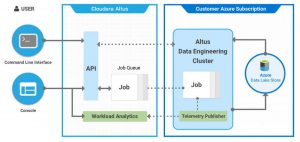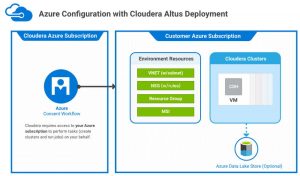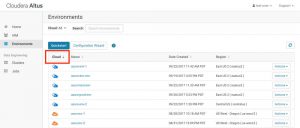Cloudera Introducing Altus Data Engineering for Microsoft Azure Beta
Enabling hybrid and multi-cloud data analytic workflows
This is a Press Release edited by StorageNewsletter.com on October 5, 2017 at 2:18 pmCloudera, Inc. announced the upcoming beta release of Altus Data Engineering for the Microsoft Azure cloud platform.
Click to enlarge
Altus, a Platform-as-a-Service (PaaS) offering built on the enterprise-grade company’s distribution, helps data engineers use on-demand cloud infrastructure to speed the creation and operation of data pipelines that power sophisticated, data-driven applications. Altus on Azure will provide an unified, and enterprise-ready data engineering experience, allowing end users greater choice in cloud infrastructure providers.
This collaboration is the latest of several between the company and Microsoft Corp. In addition to Altus, business analysts can ingest sensor data through IoT Hub, pull Cloudera – processed data into SQL Server via Polybase, and visualize insights using Microsoft Power BI for Impala. Through this integration with Microsoft, the company offers businesses machine learning tools that can support large scale data analysis and predictive analytics in a cost-efficient manner.
Click to enlarge
Altus Data Engineering on Azure simplifies the development and operations of data pipelines, focusing on data engineering workloads, while abstracting infrastructure management and operations that can be both time consuming and complex. Customers are able to host their data lakes on Azure Data Lake Store (ADLS), the hyperscale cloud storage system for data analytics, and use on-demand Azure infrastructure capacity for end user self-service capability. By separating computation and storage, ADLS is able to scale resources independently for demanding customer use cases. Because Altus is backed by the enterprise-grade Cloudera distribution, Altus reduces the risk associated with cloud migrations and workload migrations across cloud providers. It provides users with familiar tools and delivers shared storage and metadata management across data pipelines.
According to KPMG International Cooperative, Platform-as-a-Service (PaaS) adoption is predicted to be the fastest-growing sector of cloud platforms, growing from 32% in 2017 to 56% adoption in 2020. In addition, cloud adoption is now mainstream and accelerating as enterprises shift data-intensive operations to the cloud (1). The cloud is one of the fastest growing deployment environments for the firm’s customers, and this alliance offers businesses a data engineering solution for Azure.
“Cloudera makes it easy, cost-effective, and convenient to deploy data analytic workloads on cloud providers, like Microsoft Azure, taking advantage of cloud elasticity, low-cost storage and compute options, and rapid provisioning,” said Charles Zedlewski, SVP, product management, Cloudera. “We are focused on providing a service that interoperates with our complete stack to deliver a superior experience in the cloud.“
“The scope and pace at which customers’ technology stacks are changing in the multi-cloud era has a dramatic impact on both IT operatios and overall ability to meet rapidly evolving business needs,” said Mike Pickett, VP, new business and partner ecosystems, Talend, Inc. “We’re committed to helping customers chart a successful multi-cloud strategy and pleased to partner with Cloudera on extending greater choice in cloud infrastructure providers to our joint customers as they look to build cloud data pipelines for powering sophisticated, data-driven applications.“
“As the leader in Enterprise Cloud Data Management, Informatica LLC continues to invest in helping organizations easily deploy data lakes in the cloud. Informatica offers a comprehensive suite of data management products certified to run on Microsoft Azure,” said Ronen Schwartz, SVP and GM, cloud, big data, and data integration. “As an early strategic development partner for Cloudera Altus, we look forward to continuing to work closely with Cloudera in supporting data lake environments on Microsoft Azure.“
“Enterprise customers increasingly choose Microsoft Azure for their large-scale data processing workloads. We are excited that Cloudera Altus will bring an easy-to-use, end-user focused managed service experience on Azure, that is backed by the proven enterprise-grade Cloudera distribution,” said Corey Sanders, director, compute, Microsoft Azure. “Azure is the only public cloud that provides Azure Data Lake Storage designed for big data at cloud scale. Together with Cloudera Altus, we help customers build, deploy, and share analytics solutions.“
Click to enlarge
Features and benefits of Altus Data Engineering for Azure include:
-
Workload orientation: It is focused on building data pipelines rather than administering clusters or infrastructure, so users can easily submit, clone, and troubleshoot pipelines with minimal attention paid to the underlying infrastructure.
-
No data siloes: It enables data engineers to run data processing jobs that directly read from and write to ADLS. This data is available for use by other Cloudera compute engines without requiring data replication, ETL or changes to file formats, and eliminates the overhead costs of storing the same data multiple times over. In doing so users can more efficiently incorporate data engineering into their data science, BI and real time DB applications.
-
Integration with popular third-party tools provide enhanced capabilities without risk of incompatibilities.
-
Built-in workload analytics: It provides monitoring and troubleshooting capabilities for data pipelines with workload analytics. Workload analytics allows users to easily troubleshoot failed jobs. In addition, Altus workload analytics can flag workload performance deviations and perform root cause analysis. In doing so, customers can run their data pipelines with greater reliability and lower cost.
Altus Data Engineering includes support for Apache Spark, Apache Hive, and Hive on Spark, and MapReduce2.
















 Subscribe to our free daily newsletter
Subscribe to our free daily newsletter

